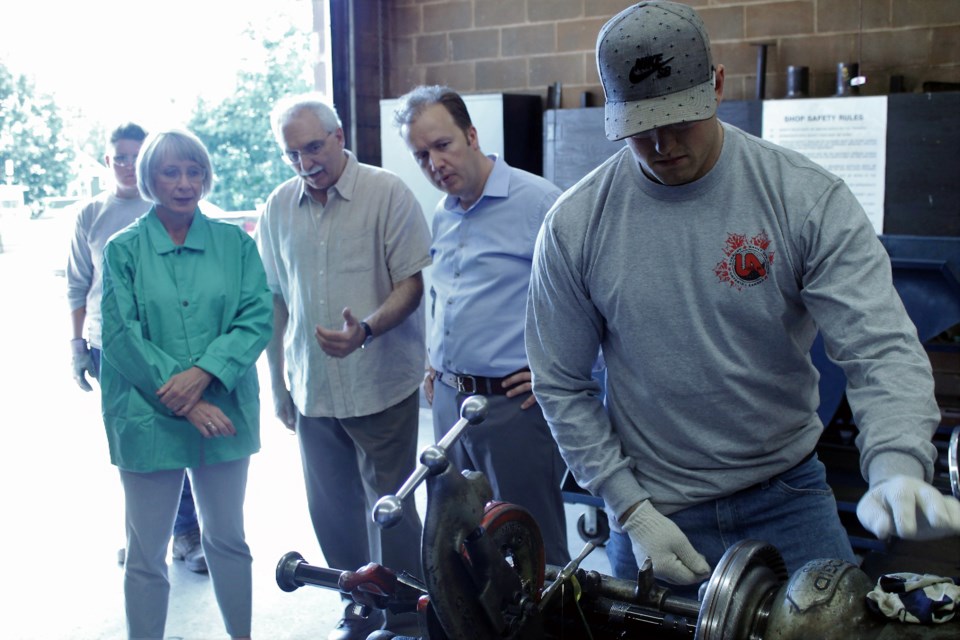Forget college — go to university and get a degree.
That's the conversation that has been taking place for generations, said Canada's minister of Employment, Workforce Development and Labour, and it's a conversation that needs to change, especially given the fact 40 per cent of the skilled trades workforce is expected to retire within 10 to 15 years.
Patty Hajdu stopped in Greater Sudbury on July 25 as part of a tour of northeastern Ontario. She visited the United Association of Plumbers and Pipefitters Local 800 on Bancroft Drive to announce $225,000 to purchase new equipment that will allow them to continue to train pipefitters, welders and other tradespeple.
“I have heard time and again that we have a shortage of skilled professionals in this country,” Hajdu said. “Unions have a very longstanding history of training tradespeople to incredible heights, and that's what our investment today is about. It's about amplifying and helping to accelerate the work they are already doing to bring new people into the skilled trades to address that shortage.”
The funding is part of a multi-phase program to address that shortage, she said.
The program will help purchase new equipment in an effort to attract new people to the trades who don't normally see themselves represented in the industry, such as women, Indigenous people, newcomers to the country, even people with disabilities, she said.
“These are people who are often looking for good opportunities, but don't necessarily see themselves in a trade, but again, unions have incredible experience attracting people to the field, and we want to help support them in that effort,
“These are good-paying, middle-class jobs with benefits and job security. These are the jobs that are critically connected to our agenda of investing in infrastructure, growing the economy and ensuring we have pipeline infrastructure to ensure we get our oil to market. This is the kind of work tradespeople will help us with and have a great living while doing so.”
Anthony Iannucci, director of training for the United Association of Plumbers and Pipefitters Local 800, said a large segment of tradespeople will be retiring soon.
“We have to transfer that knowledge through mentoring,” he said. “Our statistics tell us that about 40 per cent of us will be retiring in the next 10 to 15 years, so we need to quickly get that mentoring going.”
Easier said than done, though, Iannucci said.
“We have difficulty in attracting women and Indigenous people, but we're working on it, and we encourage everyone, regardless or sex, race or religion to submit an application.”
It won't be enough to just attract new people to the field, either, Hajdu said.
“You have to create a culture where they feel they are an integral part of the team, and that's part of the work we've been doing as a government,” she said. “We want to show them that, yes, they can have a career in the trades, and we'll help get them through the training and get them their first job.
Greater Sudbury is a trades town, said Sudbury MP Paul Lefebvre.
“We all know someone who works in the trades, and that's why it's important that we continue to invest in this relationship,” he said. “There is a need in Canada to fill those positions, so we needed to come up with a made-in-Canada solution, and this is one of those solutions.”
Having travelled across the country, talking to students, teachers and parents, one of the challenges Hajdu said she has seen over and over is the stigmatization of the a career in the trades.
“Many of us can recall our parents saying don't go to college, go to university to get that bachelor's degree,” she said. “However, often someone comes out of college with a trades certificate or moves into an apprenticeship and is immediately making more money than their colleague with a general arts degree.
“We have to reverse those conversations that have been taking place over the past few generations and talk about the trades more positively. The trades have been the backbone of the middle class, and it's the unions that have fought countless fights for a decent wage.”
